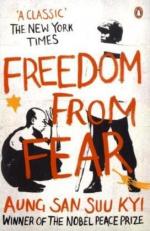|
This section contains 174 words (approx. 1 page at 400 words per page) |

|
Part 2: Section 21 Summary
The Norwegian Committee formally awarded Aung San Suu Khi the Nobel Peace Prize in October 1991 for "her non-violent struggle for democracy and human rights." The committee observed that she was the daughter of Burma's Aung San, "showed an early interest in Gandhi's non-violent protest," and that her involvement with Burma's "second struggle for independence" began in 1988, when she became the voice of a non-violent democratic movement opposing a brutal military regime. The Committee also commended her for her work at reconciling Burma's sharply divided ethnic groups. It also noted that although the 1990 Burmese democratic election had resulted in a conclusive victory for her party, the military regime had ignored the election results. The committee concluded that Aung San Suu Kyi was one of the greatest examples of civic courage in Asia in decades.
Part 2: Section 21 Analysis
The Norwegian Committee awarded her...
(read more from the Part 2: Section 21 Summary)
|
This section contains 174 words (approx. 1 page at 400 words per page) |

|




